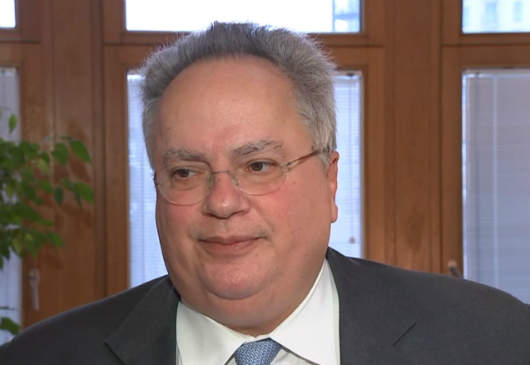 N. KOTZIAS: We talked about two issues at today’s meeting of the Foreign Affairs Council here in Brussels. We had a discussion with Mr. Netanyahu, in which we stressed our assessment of the situation as we ' ve already expressed it: that the relocation of the U.S. Embassy to Jerusalem does not contribute towards peace in the region. We also underscored the need for a two-state solution – that is, Israel and Palestine – that would also safeguard Israel’s security. We then talked about the Middle East. I underscored the need, first, for timely planning for reconstruction in Syria and for the provision of assistance by experts in the formulation of the new constitutional order. Regarding Iraq, I stressed the need for respect of the rights of autonomy provided for in the country’s constitution, just as we had earlier supported Iraq’s unity. We discussed the need for a positive agenda and a new spirit. I talked about the spirit of Rhodes, as the Arabs call it: what it is and why it contributes to the building of a new order in the Eastern Mediterranean; in other words, a new order for security and peace, in the same way the Helsinki Final Act functioned.
N. KOTZIAS: We talked about two issues at today’s meeting of the Foreign Affairs Council here in Brussels. We had a discussion with Mr. Netanyahu, in which we stressed our assessment of the situation as we ' ve already expressed it: that the relocation of the U.S. Embassy to Jerusalem does not contribute towards peace in the region. We also underscored the need for a two-state solution – that is, Israel and Palestine – that would also safeguard Israel’s security. We then talked about the Middle East. I underscored the need, first, for timely planning for reconstruction in Syria and for the provision of assistance by experts in the formulation of the new constitutional order. Regarding Iraq, I stressed the need for respect of the rights of autonomy provided for in the country’s constitution, just as we had earlier supported Iraq’s unity. We discussed the need for a positive agenda and a new spirit. I talked about the spirit of Rhodes, as the Arabs call it: what it is and why it contributes to the building of a new order in the Eastern Mediterranean; in other words, a new order for security and peace, in the same way the Helsinki Final Act functioned.
JOURNALIST: Minister, what is Israeli Prime Minister Netanyahu’s stance following President Trump’s announcement? What position did he express at the breakfast you had today?
N. KOTZIAS: The Israeli Prime Minister underscored that his country’s position is that Jerusalem is its capital. He said that, in exactly the same way the Palestinians have a right to their position that eastern Jerusalem (or, for some, all of Jerusalem) is the Palestinian capital – these are two different positions – Israel has a right to its position. That was his stance.
JOURNALIST: Do you see any flexibility from the Israeli side, that they might move ahead to talks?
N. KOTZIAS: The Israelis set a condition; that the other side recognize the right for the Jews to have their own state, which might potentially lead toward a two-state solution. Of course articles like the ones we saw last week – that the Palestinians would not pursue two states and instead orient themselves towards one state where they would focus more on human rights, within an Israeli state – do not appear to have gained ground in the politics of the region.
JOURNALIST: Minister, there was criticism regarding Turkish President Erdogan’s visit to Greece, and many people said...
N. KOTZIAS: This was the first time in the history of diplomacy that criticism of a visit began before the visit started. In other words, this isn’t political criticism. It is prophecy, divination.
JOURNALIST: On the other hand, some people – and especially the opposition – said it was a visit that you organized and that was not well organized, as it turned out, and a number of people questioned why this visit to Greece took place.
N. KOTZIAS: This visit took place because we always have to keep the channels of communication open. In Korea, where I was a week earlier, when I asked my interlocutors what their biggest problem was, they didn’t say it was the ballistic missiles. They responded that “we have no channels of communication with North Korea, and if some accident or mistake happens, we won’t be able to contain the repercussions.” The visit also took place so that we could finally impart some momentum; so that we can start implementing the major economic and transport projects we are preparing, the cooperation between universities and research centres, the G2G meeting that will take place in Thessaloniki three months from now, and to look again at how the two Ministries of Foreign Affairs will cooperate. We also talked about the Cyprus issue. Turkey is a neighbour that we have to discuss things with. It is my impression that the opposition was predetermined to consider the visit a failure before it even began. This opposition has a mindset that I call neo-isolationism and inertia. In other words, we just stay home. This may be a convenient attitude when it comes to your neighbour in a block of flats, if you don’t want to talk to him. But this doesn’t work in inter-state relations.
JOURNALIST: So would you call the visit a success, in terms of your expectations?
N. KOTZIAS: The visit benefited the country and the way in which Greek-Turkish relations are handled.
December 11, 2017


